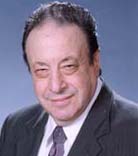
Please Note: The content on this page is not maintained after the colloquium event is completed. As such, some links may no longer be functional.
Alex Meystel
Performance Metrics for Intelligent Systems
Wednesday, March 12, 2003
Building 3 Auditorium - 3:30 PM
(Refreshments at 3:00 PM)
Dr. Alex Meystel will talk about Performance Metrics for Intelligent Systems. Is testing of intelligent systems different from testing of non-intelligent systems? Testing of performance pertains to evaluation of the potential and actual capabilities of a system to satisfy the expectations of the designer and the users via exploration of its functioning. This includes determining how well the system performs its declared "job," how efficiently and effectively it does so, how robust it is, and so forth. The "job" and expected performance must therefore be defined at the outset. Efficiency is defined as how well the system does things right, effectiveness is defined as how well the system does the right thing, and robustness is defined as "the degree to which a system" can function correctly in the presence of invalid inputs or stressful environmental conditions.: In general, the evaluation of intelligent systems (IS's) is broader than testing of non-intelligent systems (NIS). A system that has intelligence should in general be able to perform under a wider range of operating conditions than one that does not have intelligence. In addition, it should learn from its experiences and either improve its results within the same operating conditions or extend its range of acceptable conditions.
Dr. Alexander Meystel is a professor and the director of Laboratory of Applied Machine Intelligence & Robotics and the director of IMPACT Center at Drexel University. Dr. Meystel's current research are in the areas of intelligent control, autonomous robots, learning systems, computer architectures for cognitive machines and manufacturing, and the theory of knowledge representation. In 1983-87 Dr. Alex Meystel developed an outdoor autonomous mobile robot (based on a Dune-Buggy and funded by the U.S. Army). In 1987-90 he and his students developed the Intelligent Material Processing System for OSPREY Machine. This spray-casting machine is an example of the class of objects for which the intelligent controllers are especially advantageous since the system to be controlled is not completely known. OSPREY machines manufacture preforms of complicated configurations by spraying hot metal which solidifies on a substrate moving in a sophisticated way by a robotic arm. The process variables are being measured by numerous sensors, nevertheless the process is still not adequately represented.
IS&T Colloquium Committee Host: Jacqueline Le Moigne
